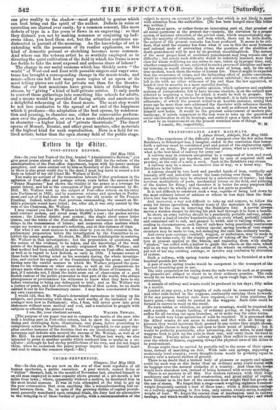CRIME - PREVENTION.
Glasgow, 21st May.1855. Sta—In this city, we are now on the eve of that most repulsive of all human spectacles, a public execution. A poor wretch, named Kelso or " Collier" Stewart, bad, in the month of November last, attached himself to an old man employed in some capacity above ground at a pit-mouth a few miles from town ; where, apparently without a motive, he murdered him in the most brutal manner. It was in vain attempted at the trial to get up the poor extenuation that even anything like a misunderstanding had ex- isted between them. So, in spite of the growing dislike of capital punish- ment generally manifested upon criminal trials, the Jury had no alternative to the bringing in of their verdict of guilty, with a recommendation of the
culprit to mercy on account of his youth,—but which is not likely to meet with attention from the authorities. [He has been hanged since this letter was written.]
This raises anew, or rather forms an interesting part of, that greatest of all social questions at the present day—namely, the elevation by a proper system of national education of thepariah class, which unquestionably sup- plies the majority of criminals, and from which, there can be little doubt, the subject of the present remarks has been produced. It seems to be evi- dent, that until the country has done what it can in this the most humane and rational mode of preventing crime, the question of the abolition of death-punishment will be met by its greatest stumblingblock. The nature of the most proper kind of secondary punishment may long remain one of difficulty ; but surely such difficulty would be infinitely lessened, were that class for whose wellbeing no one seems to care, taken up in proper time, and, whether compulsorily or not, subjected to such a process of discipline admen- tal training as would elevate them in the scale of being, and, by the only true method, teach them the value of human life. Then it might be expected that the occurrence of crime, and the indurating effect of public executions, would be comparatively infrequent, and seldom exhibited; the rare offender left to die with no other witnesses of his end than the law appointed, or handed over in security to a more merciful destiny. The mighty motive power of public opinion, which upheaves and explodes systems of jurisprudence felt to have become obsolete, is on-the subject now referred to acquiring a force for which it would be well to prepare. The direction in which it points has been long indicated ; it is daily receiving new adherents; of which the present writer is an humble instance, seeing that years ago he more than once addressed the Spectator with reference thereto; taking an opposite view from that journal, as well as different from what he himself now holds. It would be the greatest achievement of modern phi- lanthropy, if minds competent to the task were to take up the question of social amelioration in all its bearings, and settle it upon a basis which would at least be an improvement on the present wretched state of things.


































 Previous page
Previous page